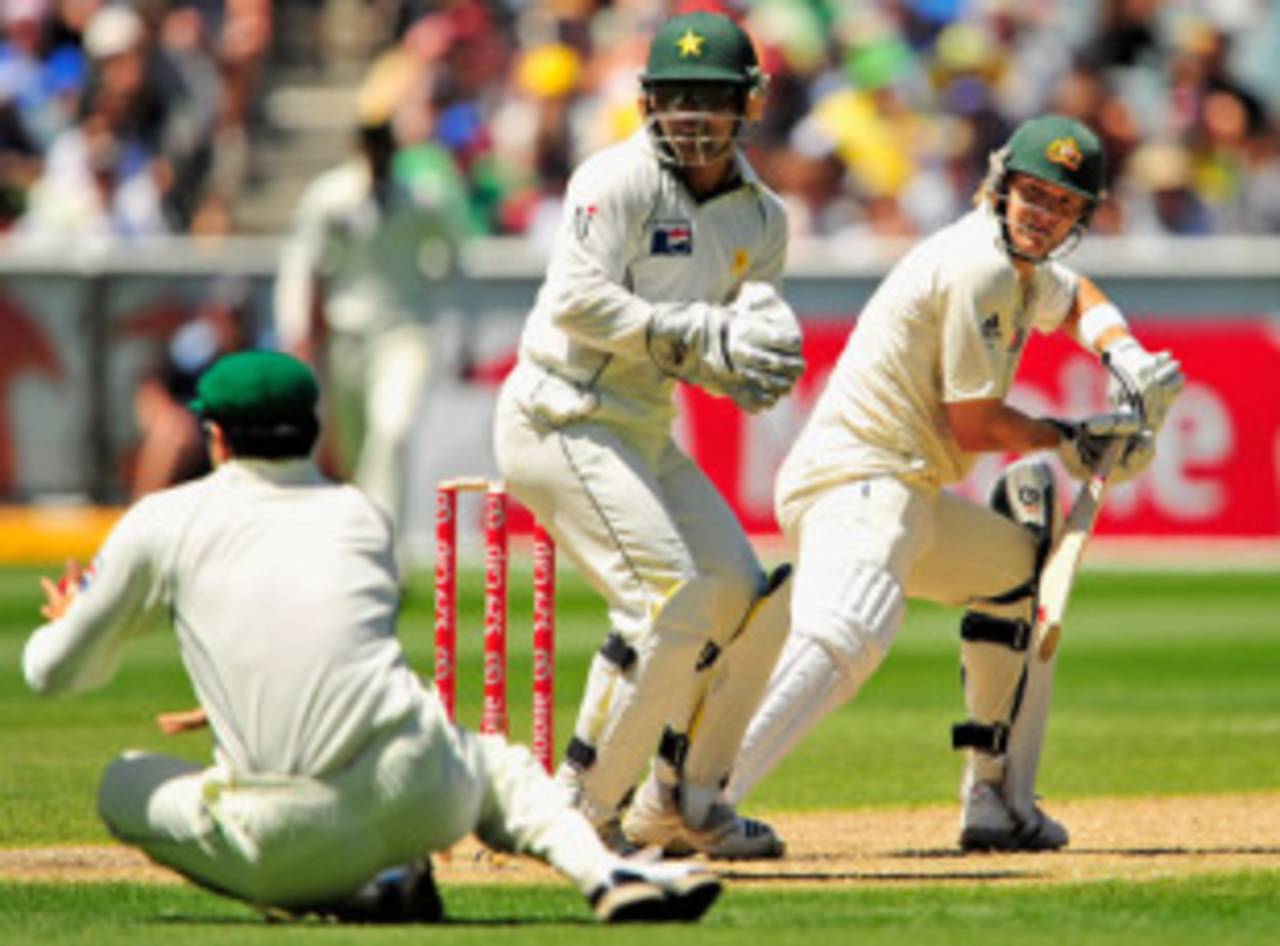Catching up...and down
If there is ever a day worse in than others in Pakistan's context to drop catches it is probably on the first day of a series against Australia in Australia
Osman Samiuddin at the MCG
26-Dec-2009

Shane Watson is dropped at first slip by Misbah-ul-Haq • Getty Images
One way of looking at it would be to suggest that two dropped catches represents an improvement in Pakistan's fielding fortunes. Their spills numbered in the double figures in New Zealand recently. They dropped seven in the Wellington Test alone, though having gone on to win that game not all hope is gone here just yet.
Pakistan have always been one to defy fielding maxims, especially about catches winning matches. They have won more Tests than they have lost around the world and have dropped catches all the while doing it. They have been doing so since 1952-53, and there are tales upon tales of legendarily poor catching right through their history.
Much of the time they have produced bowlers who didn't need fielders, preferring to target stumps and pads; Pakistan is the only established nation yet to produce an outfielder who has taken a hundred Test catches. But this attack, with men like Mohammad Asif and Mohammad Aamer, needs more than anything good men around the slip cordon and gully areas.
If there is ever a day worse than others in Pakistan's context to drop catches it is probably on the first day of a series against Australia in Australia. Few things must be as demoralizing for an opposition side, especially in front of a large, loud crowd; few in this Pakistan squad would have played before in front of nearly 60,000 people.
Both chances today should have been held, and both were critical in dictating the mood for the remainder of the day; Pakistan strove hard, but the day was not theirs. A run-out had already been missed though that is as common a mode of dismissal for a Pakistan side as batsmen being timed out. Later, Imran Farhat even dropped a beach ball. As so many others before him,
Asif was unable later to offer any explanation. "On our last tour in New Zealand we dropped too many catches and we just started badly again today. I don't know what's wrong. The coaches are working hard with the guys, the slip fielders and gully and point fielders. What else can I say?" Not much else really.
It was doubly frustrating given the unexpectedly curious shape of Pakistan's attack. Danish Kaneria's injury was unavoidable, but the thinking behind Umar Gul's dropping will need some explaining. Mohammad Yousuf muttered at the toss something about Gul being unwell. The team manager insisted he was totally fit. Asif, after the day's play, didn't get drawn into commenting on his omission. So he was dropped on form.
Fifteen wickets in six Tests at over 45 are not champion figures and Gul has lately seemed strangely one-dimensional in the longer format since the World Twenty20, even if he bowled without luck in New Zealand. But in your biggest Test for a few years, to replace his experience with that of a man with two Tests behind him demands a peculiar kind of logic.
Thus Pakistan's attack came into this Test with a grand total of 26 Tests behind them, which is less than how many Mitchell Johnson alone has played.
As it happens, Abdur Rauf turned out to be the weakest link, easing the pressure Asif and Aamer had so studiously and vigorously applied in their opening bursts. "The first session at least was pretty hard work and at the start there weren't too many scoring options, especially the first ten overs," Shane Watson said. "I think I was stuck on two for quite a while because they didn't bowl really any bad balls at all. I was very impressed by Aamer, the way he bowled. He didn't bowl too many bad balls at all. He bowls good pace and also mixes it up pretty well with his slower ball."
Until late in the afternoon in fact, as a unit Pakistan had stuck at it well, even if it felt at moments that it could all fall apart at any moment. Aamer and Asif bowled probing lengths and Saeed Ajmal was a persevering, pesky presence through a marathon, rhythmic spell. Watson was
lucky to survive it.
"It's a big challenge to be able to face someone who gets the ball to go the other way. He's definitely one of the ones who it's harder to pick," Watson said. "His doosra was getting a bit of turn and bounce as well, and that was probably the thing that was making it even more difficult because that was actually turning and bouncing just about even more than his normal offspinner. I was lucky to get through him on 40-odd when I got dropped. To be able to get through him unscathed was a good challenge."
Nothing has been set in stone in this Test just yet, but there was enough in three-quarters of Pakistan's attack to suggest interesting days lie ahead. With this kind of catching and selectorial thinking, though, that is a given in any case.
Osman Samiuddin is Pakistan editor of Cricinfo